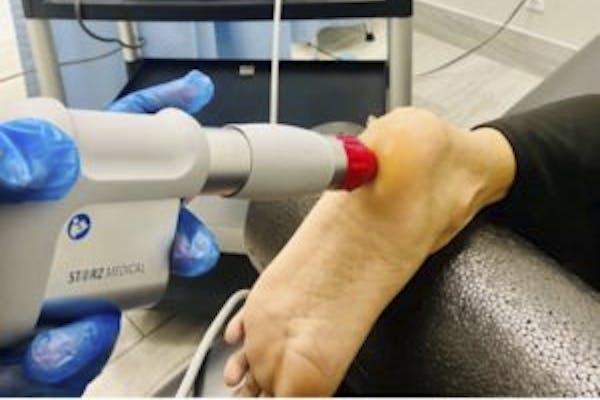Call Now for an Appointment (519) 267-8787

What is Shockwave Therapy?
- Are you a runner experiencing knee pain?
- Is your heel pain limiting you to enjoy long walks?
- Does your wrist/elbow pain give you discomfort in picking up or gripping things?
- Do you have muscle stiffness or muscular pain which is bothering you while doing your favourite activities?
If you have answered YES to any of these questions, Shockwave Therapy could be a solution for your pain and discomfort!
Here are some helpful facts about Shockwave therapy:
What is Shockwave Therapy & How does it work?
Use of Shockwave Therapy was first introduced in Medical clinical settings for treating urinary stones.
Shockwave Therapy (Also known as Extra-Corporeal Shockwave Therapy) are basically sound waves having high pressure followed by low amplitude pulses applied by means of a “Shockwave Head” with a coupling gel. It is an effective non-invasive treatment tool that is often used by Physiotherapists to help reduce the muscular tension in different muscles or soft tissues as indicated. Shockwave Therapy is gaining popularity among Physiotherapists to get amazing results for treating those chronic, nagging pain associated with musculoskeletal conditions.
Shockwave therapy has proven to be facilitating new blood supply to the injured area/tissues which help in tissue healing and repair.
Research has also stated that shockwave therapy promotes the production of pain-inhibiting substances in the body for pain reduction.
What is Shockwave Therapy used for?
Shockwave therapy is used for a of variety of musculoskeletal conditions including tendon injuries, muscular spasm/tightness conditions, chronic pain conditions. Here are some of the conditions that are most commonly treated, but not limited to, with Shockwave Therapy:
- Tennis elbow
- Shoulder impingement (Tendinitis)
- Plantar Fasciitis
- Achilles Tendinopathy
- Hamstring injuries
- Runner’s Knee (Patello-femoral Pain Syndrome)
- Piriformis Syndrome (syndrome including low back pain, sacroiliac joint pain with/without radiation of the pain in legs)
- Hip bursitis
What to expect during a shockwave Therapy treatment session?
- Your Physiotherapist will perform a detailed assessment for your painful condition to establish a physical diagnosis for you.
- He/she will then determine the area and dosage for application of shockwave therapy, as per indication. He/she will also set the required parameters such as frequency, pressure and number of pulses to be given on the Shockwave Machine.
- Administration of Shockwave Therapy takes a short duration, typically about 3-4 minutes. You will experience short pressure pulses on the painful area delivered with shockwave head by your physiotherapist.
- Typically, Shockwave therapy is administered twice a week for about 3-4 weeks (6-8 sessions), depending upon the severity of the pain and the condition. Your physiotherapist will design your plan of care as needed.

Frequently Asked Questions (FAQ):
Are there any side-effects of Shockwave therapy?
There are no adverse effects of Shockwave therapy. However, it is common to develop some localised muscle soreness/tenderness, skin redness immediately after the treatment which can last about 20 minutes to few hours.
Can I resume my daily activities after shockwave therapy?
Yes, as shockwave therapy induces minimal to no discomfort after treatment, you can resume all the daily activities or recreational activities, unless specified otherwise by your physiotherapist.
Also, your physiotherapist will provide you with a home exercise program to strengthen and stretch your muscles and joints for your optimal functioning.
Here is a summary for you about Shockwave Therapy!
If you have any questions or concerns about Shockwave Therapy and your pain, please contact us.

